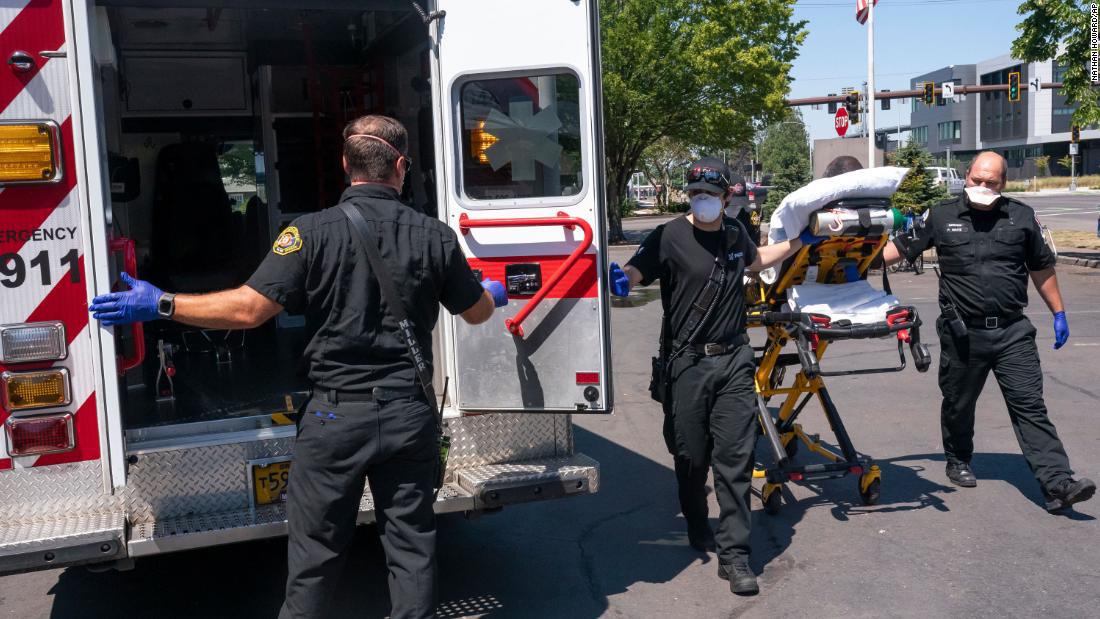Thaw of 3 volcanoes in Washington due to heat wave 0:55
(CNN) -
The heat wave in the Pacific Northwest in late June was a mass casualty event, according to authorities. Hundreds of people are likely to have died during the several days of unprecedented heat, and the number continues to rise. At least 83 people have died from heat-related illnesses in Oregon, and authorities are investigating another 32 deaths. In Washington state, at least 78 people died. Across the border in British Columbia, Canadian authorities counted nearly 800 deaths between June 25 and July 1, 500 more than normal for that period and believed to be heat-related, according to Lisa Lapointe, chief of the province's forensics. In reality, it could be months before the final figure is known.
Extreme heat cooked mussels, clams and other shellfish alive on Canada's beaches
Despite the alarming statistics, there was no apparent sense of urgency surrounding the tragedy: nothing like a hurricane making landfall, an attacker opening fire in a nightclub, or a wildfire destroying a city.
There were hundreds of silent deaths from an invisible disaster: unprecedented heat, which dozens of scientists concluded was "practically impossible" without climate change.
Scientists and psychologists told CNN that the answer has to do with the way humans view crises.
"When there's a wildfire or hurricane, it's easy for people to see the devastation right before their eyes," said Aaron Bernstein, acting director of the Center for Climate, Health and the Global Environment at the TH School of Public Health. Chan from Harvard.
"Our brains are very attuned to images of destruction, because we don't want that to happen to us. With heat waves, there is usually no visible strip of destruction."
The heat wave also came against the backdrop of another deadly tragedy: the collapse of a condo in Miami, Florida.
As of Monday, 94 people had been declared dead and 22 more had not been located.
The heat wave began the day after the landslide, but only one of those events really captured the nation's attention.
Bernstein noted that the public response to a tragedy has to do in part with who is responsible.
People want someone to blame, he said, and in tangible catastrophes it's easy to point a finger: in the case of the Surfside collapse, a homeowner or an engineer.
advertising
But it's different when it comes to a global crisis like climate change, which doesn't kill people directly, but makes an event more likely to be deadly.
"There is not a single person to point the finger at on climate change," Bernstein said.
"Our brains are much more likely to pay attention when there is a person to point to. There are other reasons, but all of them make it very clear to me that we have to make climate change personal, achievable and urgent."
Unprecedented heat, hundreds of deaths and a destroyed city.
Climate change is scorching the northern hemisphere
Humans also tend to connect more with short-term tragedies than with events that seem far away, such as climate change might seem, according to Astrid Caldas, a climate scientist at the Union of Concerned Scientists.
"We can't really compare the tragedies and the events, because they are separate and both were terrible events," Caldas told CNN.
"But there are all these complex constructions of people's psyches and how the behavior of the media contributes to that lack of the same reaction."
According to Kristie Ebi, a climate and health researcher at the University of Washington, these responses to the catastrophes caused by climate change and the damage it is causing to people are not that different from people's reactions to the climate change pandemic. covid-19, as the delta variant spreads rapidly.
Delta variant: this is how the different vaccines work against this version of the new coronavirus
"More than 600,000 Americans died [from covid-19] and yet there was a limited response in many quarters," Ebi told CNN.
"When we look at heat waves, we often don't get the total number of deaths until months later," which are often much higher than initial estimates.
Like the pandemic, extreme heat also disproportionately kills low-income communities, people of color, and older populations.
As of Monday, Oregon health authorities reported that about two-thirds of deaths from the heat wave were people of color.
An analysis conducted in 2020 found that the number of heat-related deaths in the U.S. each year has been underestimated, as registries typically only look at medical terms like heat stroke, leaving out other potentially heat-related causes of death. heat, such as heart attacks and other underlying conditions.
Ebi said that most people, especially in a typically temperate region like the Pacific Northwest, do not perceive heat as a health risk.
"People are generally not aware and do not think about the risks associated with these high temperatures," he said.
"There have been a number of efforts to try to increase that awareness, and yet there is almost no research to support the efficacy of any approach."
This is what happens to your body in extreme heat
The researchers say it is important to understand that climate change is already affecting our lives today: that unless climate resilience or heat action plans are put in place, especially in historically marginalized communities, many people will suffer. and they will die from extreme heat as climate change accelerates.
"If nothing is done, and people remain vulnerable, I would say that, logically, the number of people affected will increase," Caldas said.
"We have to know what could happen if we don't act. It's about trying to prevent what can happen, if we don't take any action."
- Brisa Colón, from CNN, contributed to this report.
Climate change heat wave











